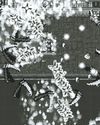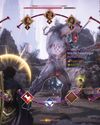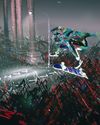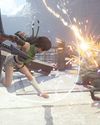Techlands sequel is more social sandbox than zombie killer

Don’t think of Dying Light 2 as a zombie game, or a survival game, or even an open-world game in the usual sense. Think of it instead as a playable map editor, an exercise in sculpting the human and physical geography of a pestilent European metropolis – not with a cursor, but with a flying kick. Set a few years after its predecessor’s undead apocalypse, the game is built once again around the three principles of “natural movement” (Mirror’s Edge without the linearity), first-person melee (Mirror’s Edge with squelchier combo finishers) and a dayand-night cycle that alters the threat level. But it places a much greater emphasis on story, and that story is not so much told as embodied in the changing terrain.
It’s there in the fact that the streets in one district are no longer safe to wander, but there are now ziplines between crumbling facades to keep you out of harm’s way. It’s there in the queues of thankful refugees by water pumps, or the thickening of undead presence in certain alleyways, or the springing up of windmills on the horizon. All of these alterations, little and large, are the result of player interactions with the city’s people and factions, as Tymon Smektala, lead designer, explains; they reflect a commitment to telling a story that is just as malleable and unpredictable as the average zombie encounter.
This story is from the December 2018 edition of Edge.
Start your 7-day Magzter GOLD free trial to access thousands of curated premium stories, and 9,000+ magazines and newspapers.
Already a subscriber ? Sign In
This story is from the December 2018 edition of Edge.
Start your 7-day Magzter GOLD free trial to access thousands of curated premium stories, and 9,000+ magazines and newspapers.
Already a subscriber? Sign In

BONAPARTE: A MECHANIZED REVOLUTION
No sooner have we stepped into the boots of royal guard Bonaparte than we’re faced with a life-altering decision.

TOWERS OF AGHASBA
Watch Towers Of Aghasba in action and it feels vast. Given your activities range from deepwater dives to climbing up cliffs or lumbering beasts, and from nurturing plants or building settlements to pinging arrows at the undead, it’s hard to get a bead on the game’s limits.

THE STONE OF MADNESS
The makers of Blasphemous return to religion and insanity

Vampire Survivors
As Vampire Survivors expanded through early access and then its two first DLCs, it gained arenas, characters and weapons, but the formula remained unchanged.

Devil May Cry
The Resident Evil 4 that never was, and the Soulslike precursor we never saw coming

Dragon Age: The Veilguard
With Dragon Age: The Veilguard, BioWare has made a deeply self-conscious game, visibly inspired by some of the best-loved ideas from Dragon Age and Mass Effect.

SKATE STORY
Hades is a halfpipe

SID MEIER'S CIVILIZATION VII
Firaxis rethinks who makes history, and how it unfolds

FINAL FANTASY VII: REBIRTH
Remaking an iconic game was daunting enough then the developers faced the difficult second entry

THUNDER LOTUS
How Spirit farer's developer tripled in size without tearing itself apart